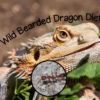Bearded dragon bites can be mild to breaking skin. These reptiles are generally not aggressive and more inclined to bluff than to bite. This behavior makes them popular pets, especially among those new to reptile ownership. Despite their peaceful disposition, understanding their behavior, including the rare instances when a bearded dragon might bite, is crucial for a harmonious human-reptile relationship.

Jump To…
Bearded Dragon Bites: 6 Signs and Reasons
1. Feeling Threatened: Like many animals, a bearded dragon may bite if it feels threatened, cornered or stressed. This defensive behavior is a natural response to perceived danger.
2. Accidental Bites During Feeding: When hand-feeding, bearded dragons can accidentally bite your fingers, mistaking them for food.
3. Mistaken Identity: Interestingly, bearded dragons can react to certain colors, like nail polish, leading to bites out of curiosity or confusion.
4. Poor Handling: Rough or improper handling can stress these reptiles, leading to a bite.
5. Lack of Taming: An untamed bearded dragon is more likely to bite, as it hasn’t learned to trust human handlers.
6. Breeding Season: Some bearded dragons, males in particular, can be aggressive when they come out of brumation ready for breeding season.
Stay outta my house! -🚫🏠✋Teodoro – Justin Peter
Posted by Bearded Dragons World on Thursday, February 4, 2016
How Hard Do Bearded Dragons Bite?
Bearded dragon bites range in intensity based on the species, age and reason behind it. For example, a bite due to mistaking a finger for food might be gentle, more of a grab. However, if the reptile feels threatened, it could deliver a more forceful bite.
Bearded dragon bites from a Pogona minor (small) will be vastly different to the bite of a Pogona vitticeps (large).
It’s important to note that a bearded dragon cannot sever a human adult finger. The bite force also varies between species; for instance, a bite from a small Pogona minor differs significantly from that of a larger Pogona vitticeps.
Do bearded dragon bites hurt? Yes, a bearded dragon bite can break the skin. The teeth of bearded dragons are sharp enough to cause minor injuries.
Are Bearded Dragons Poisonous?
No, bearded dragons are not poisonous to humans.
The discovery that bearded dragons possess venomous glands was a significant advancement in our understanding of these popular reptiles. Previously, bearded dragons were not considered venomous. A pivotal research study in 2005 by Australian scientists (Fry, Vidal, Norman, et al.) revealed an important fact. Bearded dragons, along with other lizard species such as iguanas and Komodo dragons, have venom glands. The venom glands are located in both their upper and lower jaws.
The venom found in bearded dragons is relatively mild compared to that of more notoriously venomous reptiles like rattlesnakes. It is used primarily to paralyze small prey in the wild. While this venom shares some genetic similarities with rattlesnake toxins, it is produced in such minute quantities that it is not harmful to humans. A bite from a bearded dragon might result in minor bruising, swelling, or a mild burning sensation, but it is not considered dangerous to humans.
In summary, while bearded dragons do possess venom, it is of such low potency that it poses no significant threat to humans. This fact, combined with their generally docile nature, ensures they remain a safe and popular choice for reptile enthusiasts.
What to Do If Bitten by a Bearded Dragon
Bearded dragons are generally docile and rarely bite. When they do, the primary concern is not the venom but the potential for infection, such as from bacteria like Salmonella. Proper hygiene, such as washing hands after handling the dragon or cleaning its enclosure, is essential to reduce the risk of infection.
If bitten, clean the wound immediately with a disinfectant, apply a Band-Aid, and consult a doctor to address any concerns of zoonotic diseases such as salmonella.
Bearded Dragons and Color Perception
Bearded dragons can react to colors, which might explain why they behave differently towards certain nail polish colors. Their color-changing ability, influenced by temperature, also plays a role in their behavior. Instances of bearded dragons reacting to red, pink, or fluorescent colors with licks or bites have been reported.
8 Effective Strategies for Preventing Bearded Dragon Bites
Here are some strategies to prevent bearded dragon bites:
- Proper Handling: Gently and correctly handling your bearded dragon is crucial. Avoid sudden movements or grabbing them abruptly, as this can startle them. Instead, approach them calmly and let them become accustomed to your presence and touch.
- Building Trust: Develop a bond with your bearded dragon through regular, gentle interaction. Bearded dragons are capable of feeling. Building trust-building makes them less likely to see you as a threat and reduces the chances of biting.
- Use of Feeding Tongs: When feeding your bearded dragon, especially live prey or treats, use feeding tongs. These tools create a safe distance between your fingers and the dragon’s mouth, significantly reducing the risk of accidental bites. Feeding tongs also help in controlling the portion and placement of food, making the feeding process smoother and safer for both you and your pet.
- Recognizing Stress Signals: Be vigilant about your bearded dragon’s behavior and body language. Signs of stress or discomfort, such as hissing, puffing up, or a black beard, can indicate that they might bite. If you notice these signs, give them space and time to calm down.
- Creating a Comfortable Environment: Ensure your bearded dragon’s habitat is comfortable, with the right temperature gradients, hiding spots, and lighting. A comfortable and stress-free environment keeps them relaxed and less prone to defensive behaviors.
- Regular Feeding Schedule: Maintain a consistent feeding schedule. Hunger can make bearded dragons more irritable and prone to biting. A regular feeding routine ensures they remain calm and satiated.
- Avoiding Overstimulation: During periods of high activity or environmental changes (like cleaning their habitat or introducing new objects), bearded dragons can become overstimulated. During these times, limit handling to reduce the risk of a stress-induced bite.
- Sudden aggression can be linked with breeding season: Bearded dragon bites may also be related to breeding season. Particularly males coming out of brumation can be more aggressive than when they initially went to sleep.
References
- 2020 Central Bearded Dragon. The Australian Museum.
- Fry, B. G., Vidal, N., Norman, J. A., Vonk, F. J., Scheib, H., Ramjan, S. F. R., Kuruppu, S., Fung, K., Blair Hedges, S., Richardson, M. K., Hodgson, Wayne. C., Ignjatovic, V., Summerhayes, R., & Kochva, E. (2005). Early evolution of the venom system in lizards and snakes. Nature, 439(7076), 584–588.





